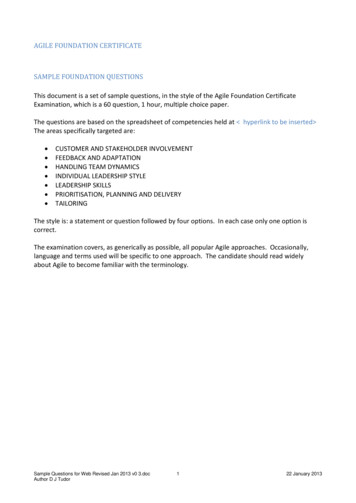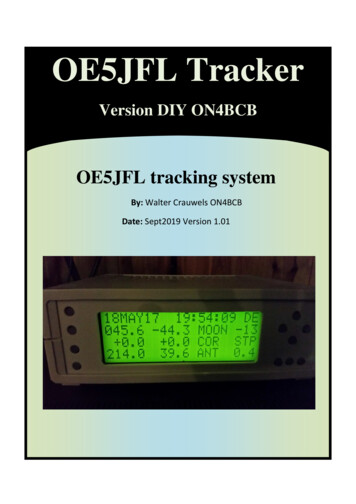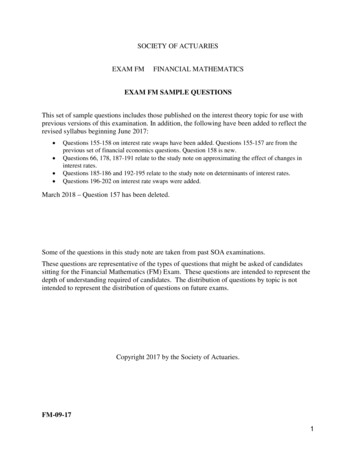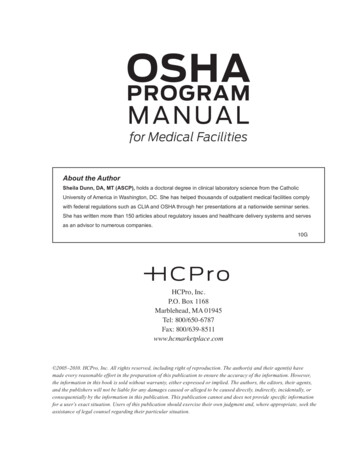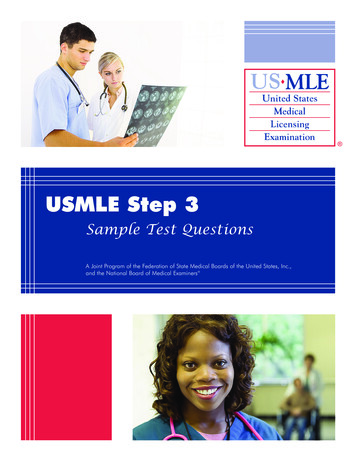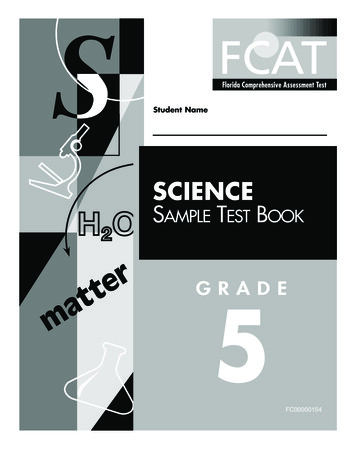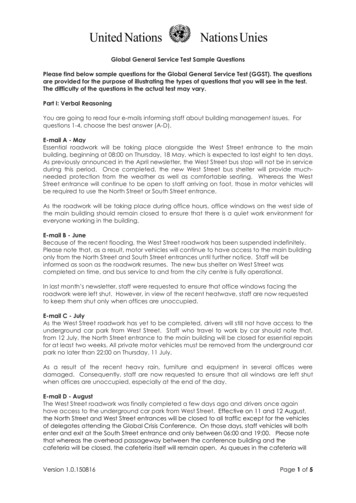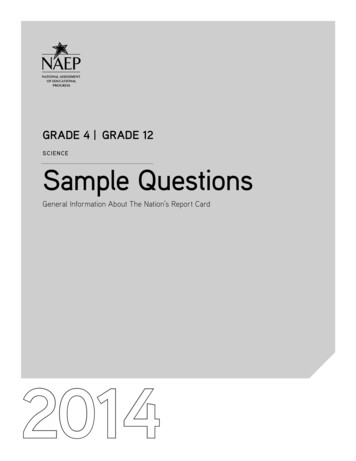
Transcription
GRADE 4 GRADE 12SCIEN CESample QuestionsGeneral Information About The Nation’s Report Card2014
National Assessment of Educational Progress2014 Sample Questions BookletI.About This Sample Questions Booklet . . . . . . . . . . . . . . . . . . . . . . . . . . . . . . . . 4II.The Science Pilot Study . . . . . . . . . . . . . . . . . . . . . . . . . . . . . . . . . . . . . . . . . . 5Sample Science Questions Grade 4 . . . . . . . . . . . . . . . . . . . . . . . . . . . . . . 8Sample Science Questions Grade 12 . . . . . . . . . . . . . . . . . . . . . . . . . . . . 10III. Student Questionnaires . . . . . . . . . . . . . . . . . . . . . . . . . . . . . . . . . . . . . . . . . 12IV.Subject Questionnaires . . . . . . . . . . . . . . . . . . . . . . . . . . . . . . . . . . . . . . . . . 19V.NAEP Questions Tool . . . . . . . . . . . . . . . . . . . . . . . . . . . . . . . . . . . . . . . . . . . 33VI. About NAEP . . . . . . . . . . . . . . . . . . . . . . . . . . . . . . . . . . . . . . . . . . . . . . . . . . 34
42014 Science Grades 4 and 12 Sample Questions BookletI. About This Sample Questions BookletOn behalf of the National Assessment of Educational Progress (NAEP), I want tothank you for your participation in this essential measure of student achievement inthe United States. NAEP tells us what students in our country know and can do. In thecoming year, fourth- and twelfth-graders will participate in NAEP and will be assessedin science as part of a pilot study. It will take about 90 minutes for most students toparticipate in the pilot. Results will not be released, but will be used to inform futureNAEP science assessments. The test booklet contains 50 minutes of test questions andbrief student questionnaires.NAEP is voluntary and individual student scores are not reported. Answers toall student questions are confidential, and student names are removed from all pilotmaterials before the materials leave the school.The pilot results allow NAEP to study the proficiencies (or scores) and gaininformation about student experience, the school environment, and learning opportunitiesavailable to students. The questionnaires provide educators and policymakers withcontextual information for future assessments, as well as information about factorsthat may be related to students’ learning. This booklet includes these questionnaires topromote understanding of the assessment.If you have any questions or comments regarding NAEP or would like to view previousreport cards, please visit the NAEP website at http://nces.ed.gov/nationsreportcard.Also available through the website is the NAEP Questions Tool (http://nces.ed.gov/nationsreportcard/itmrlsx), which allows you to review additional sample questions withcorrect answers.Peggy G. Carr, Ph.D.Associate Commissioner for AssessmentNational Center for Education StatisticsInstitute of Education SciencesNAEP is administered by the National Center for Education Statistics, within the U.S. Department of Education’s Institute ofEducation Sciences. Policy for the assessment, including its content and standards, is set by the independent, bipartisanNational Assessment Governing Board (http://www.nagb.org).
Science—Grades 4 and 125The Science Pilot StudyThe 2014 NAEP pilot in science for grades 4 and 12 contains multiple-choicequestions, as well as short and extended constructed-response exercises. At least 50percent of the pilot time is devoted to constructed-response exercises. These questionsmeasure students’ knowledge of facts, ability to integrate this knowledge into largerconstructs, and capacity to use the tools, procedures, and reasoning processes ofscience to develop an increased understanding of the natural world.The 2014 NAEP science pilot is organized according to science content andpractices. For more information regarding the framework used to design the pilot,please visit the National Assessment Governing Board’s website at e ContentPhysical Science (30%)*MatterLife Science (30%)Structures and Functions of Living Systems Properties of Matter Organization and Development Changes in Matter Matter and Energy TransformationsEnergy Interdependence Forms of Energy Energy Transfer ConservationChanges in Living Systems Heredity and Reproduction Evolution and DiversityMotionEarth and Space Science (40%)Earth in Space and Time Objects in the Universe History of the EarthEarth Structures Properties of Earth Materials TectonicsEarth Systems Energy in Earth Systems Motion at the Macroscopic Level Climate and Weather Forces Affecting Motion Biogeochemical Cycles* Item distribution for the content areas is measured by percentage of student response time.Science PracticesThe frameworks reflect these four science practices: Identifying Science Principles (25%)** Using Science Principles (35%) Using Scientific Inquiry (30%) Using Technological Design (10%)** Item distribution for the science practices is measured by percentage of student response time.
6Science—Grades 4 and 12Science Booklet DirectionsIn each of sections 1 and 2, you will have 25 minutes to answer a series of questionsabout science.You will be asked to respond to several different types of questions. Some of thequestions will require you to choose the best answer and fill in the oval for that answer inyour booklet. On questions like this, be sure to mark your answers clearly and darken theoval completely. If you make a mistake or want to change your answer, be sure to erase anyunwanted marks. Here is an example of a question that requires you to fill in an oval.How hot is it on the surface of the Sun?A Not quite as hot as boiling waterB About as hot as fireC About 100 FMuch hotter than almost anything on EarthExample 1For some questions, you will be asked to write short answers on the blank lines provided inyour booklet. Here is an example of a question that requires you to provide a short answer.Example 2Also, you will be asked to answer some questions by writing longer, more detailedresponses. For example, here is a question that requires you to provide a longer answer.GO ON TO THE NEXT PAGE
Science—Grades 4 and 127Example 3When you are asked to write your response be sure that your handwriting is clear. Thinkcarefully about each question and make your answers as complete as possible, using asmany lines as you need. If you finish a section before time is called, you may go back andcheck your work on that section only.Finally, in some questions you may be asked to draw a diagram or fill in a table.
8Science—Grade 4Sample Science QuestionsGrade 4123HE0017771. Name the parts of the plant above that are labeled 1, 2, and 3. Explain the function ofeach part.Name of PartFunction1.2.3.HE0014622. On steep slopes along the sides of new roads, highway department workers often growplants to prevent the soil from being eroded. Describe two ways that these plants keepthe soil from eroding.GO ON TO THE NEXT PAGE
Science—Grade 49VB508131After two hours, the bottle looked like the drawing above. What can the studentconclude based on what he sees in the bottle?A The water is heavier than the grains of clay and the grains of sand.B The grains of clay are heavier than the grains of sand and the waterC The grains of sand are heavier than the water and the grains of clayD The water, grains of clay, and grains of sand are all of equal weight.HE001463LandOceanDead ocean animalsfall to the bottomof the oceanRock layers format ocean bottomA LavaB IgneousC SedimentaryD MetamorphicSTOP
10Science—Grade 12Sample Science QuestionsGrade 12HE0018871. A newspaper article reported that a fossil was found that was 200,000 years old accordingto generally accepted radioactive dating procedures. A letter to the editor of the newspaperdisputed the accuracy of the age determination because the fossil was found closer to theEarth’s surface than were previously discovered fossils of the same age.Which of the following would be an appropriate argument against the letter writer’s claim?A Older rock layers commonly lie deeper underground than younger ones.B Older rock layers may be pushed closer to the surface by geologic processes.C The age of a rock layer can often help in determining the age of the fossils it contains.D Fossils form only under certain conditions.JL0011492. When very small particles in a dish of water are examined with a powerful microscope,the particles often appear to move in a rapid, random motion. Explain what causes thismovement of the particles.GO ON TO THE NEXT PAGE
Science—Grade 1211HE001668X — Y Z energy3. The equation above represents a nuclear decay, in which nucleus X decays into particleY and nucleus Z and releases energy. Which of the following can explain why energy isreleased in the decay?A The mass of X is less than the sum of the masses of Y and Z.B The mass of X is less than the difference between the masses of Y and Z.C The mass of X is greater than the sum of the masses of Y and Z.D The mass of X is greater than the difference between the masses of Y and Z.STOP
12Student Questionnaires—Grade 4III. Student QuestionnairesGrade 4In this section, please tell us about yourself and your family. Please answer questions aboutyour home based on where you live most of the time during the school year. The section hasone oval for each questionexcept where instructed otherwise.VB3313301. Are you Hispanic or Latino? Fill in oneor more ovals.VB3313312. Which of the following best describesyou? Fill in one or more ovals.A No, I am not Hispanic or Latino.A WhiteB Yes, I am Mexican, MexicanB Black or African AmericanAmerican, or Chicano.C Yes, I am Puerto Rican or PuertoRican American.D Yes, I am Cuban or CubanAmerican.C AsianD American Indian or Alaska NativeE Native Hawaiian or other PacificIslanderE Yes, I am from some otherHispanic or Latino background.J1D1-RAPage 1GO ON TO THE NEXT PAGE
Student Questionnaires—Grade 413VB3313353. About how many books are there inyour home?A Few (0–10)B Enough to fill one shelf (11–25)C Enough to fill one bookcase (26–100)D Enough to fill several bookcases(more than 100)TB0011016. About how many pages a day do youhave to read in school and forhomework?A 5 or fewerB 6–10C 11–15D 16–20E More than 20VB3313364. Is there a computer at home thatyou use?VB3313397. How often do you talk about things youhave studied in school with someone inyour family?A YesB NoA Never or hardly everVF0986645. Do you have the following in yourhome? Fill in ovals for all that apply.B Once every few weeksC About once a weekA Access to the InternetD Two or three times a weekB Clothes dryer just for your familyE Every dayC DishwasherVB331447D More than one bathroomE Your own bedroom8. How many days were you absent fromschool in the last month?A NoneB 1 or 2 daysC 3 or 4 daysD 5 to 10 daysE More than 10 daysJ1D1-RAPage 2GO ON TO THE NEXT PAGE
14Student Questionnaires—Grade 4VB3314519. How often do people in your home talkto each other in a language other thanEnglish?A NeverB Once in a whileC About half of the timeD All or most of the timeVF09573010. Do the following people live in yourhome? Fill in ovals for all that apply.A MotherB StepmotherC Foster mother or other female legalguardianD FatherE StepfatherF Foster father or other male legalguardianJ1D1-RAPage 3STOP
Student Questionnaires—Grade 1215Student QuestionnairesGrade 12In this section, please tell us about yourself and your family. Please answer questions aboutyour home based on where you live most of the time during the school year. The section hasone oval for each questionexcept where instructed otherwise.VB3313301. Are you Hispanic or Latino? Fill in oneor more ovals.VB3313312. Which of the following best describesyou? Fill in one or more ovals.A No, I am not Hispanic or Latino.A WhiteB Yes, I am Mexican, MexicanB Black or African AmericanAmerican, or Chicano.C Yes, I am Puerto Rican or PuertoRican American.D Yes, I am Cuban or CubanAmerican.C AsianD American Indian or Alaska NativeE Native Hawaiian or other PacificIslanderE Yes, I am from some otherHispanic or Latino background.J3D1Page 1GO ON TO THE NEXT PAGE
16Student Questionnaires—Grade 12VB3313353. About how many books are there inyour home?A Few (0–10)B Enough to fill one shelf (11–25)C Enough to fill one bookcase (26–100)D Enough to fill several bookcases(more than 100)TB0011016. About how many pages a day do youhave to read in school and forhomework?A 5 or fewerB 6–10C 11–15D 16–20E More than 20VB3313364. Is there a computer at home thatyou use?VB3313397. How often do you talk about things youhave studied in school with someone inyour family?A YesB NoA Never or hardly everVF0986645. Do you have the following in yourhome? Fill in ovals for all that apply.B Once every few weeksC About once a weekA Access to the InternetD Two or three times a weekB Clothes dryer just for your familyE Every dayC DishwasherVB331447D More than one bathroomE Your own bedroom8. How many days were you absent fromschool in the last month?A NoneB 1 or 2 daysC 3 or 4 daysD 5 to 10 daysE More than 10 daysJ3D1Page 2GO ON TO THE NEXT PAGE
Student Questionnaires—Grade 1217VB3308709. How far in school did your mother go?A She did not finish high school.B She graduated from high school.C She had some education after highschool.VF09573012. Do the following people live in yourhome? Fill in ovals for all that apply.A MotherB StepmotherC Foster mother or other female legalguardianD She graduated from college.D FatherE I don’t know.E StepfatherVB33087110. How far in school did your father go?F Foster father or other male legalguardianA He did not finish high school.B He graduated from high school.C He had some education after highschool.D He graduated from college.E I don’t know.VB33145111. How often do people in your home talkto each other in a language other thanEnglish?A NeverB Once in a whileC About half of the timeD All or most of the timeJ3D1Page 3GO ON TO THE NEXT PAGE
18Student Questionnaires—Grade 12VF29122413. During this school year, which of thefollowing have you done? Fill in ovalsfor all that apply.A Taken the SAT or ACT CollegeEntrance ExamsHE00254914. Which of the following best describesyour high school program?A GeneralB Academic or college preparatoryB Submitted the Free Application forFederal Student Aid (FAFSA)C Applied to a 2-year collegeC Vocational or technicalVE102537D Been accepted to a 2-year college15. Write the ZIP code of your home addressin the boxes.E Applied to a 4-year collegeF Been accepted to a 4-year collegeG Applied to a certificate or diplomaprogram at a school that providesoccupational training (such aselectrician, beautician, mechanic,computer programmer, etc.)H Been accepted to a technicaltraining programI Talked with a military recruiterJ Enlisted in the militaryK Applied for a full-time jobL Been interviewed for a full-time jobM None of the aboveJ3D1Page 4STOP
Science Subject Questionnaires—Grade 419IV. Science Subject QuestionnairesGrade 4This section has 32 questions. Mark your answers in your booklet. Fill in only one ovalfor each question.VC315287VF6330401. In this school year, how often have youdone activities or projects in science?3. In this school year, how often haveyou done activities or projects to learnabout electricity (for example, circuits,batteries, and light bulbs)?A Never or hardly everB Once every few weeksA Never or hardly everC About once a weekB Once every few weeksD Two or three times a weekC About once a weekE Every day or almost every dayD Two or three times a weekE Every day or almost every dayVC3152082. In this school year, how often haveyou done activities or projects tolearn about living things (for example,plants, animals, bacteria)?VC3152194. In this school year, how often haveyou done activities or projects to learnabout chemicals (for example, mixingsugar or salt in water)?A Never or hardly everB Once every few weeksA Never or hardly everC About once a weekB Once every few weeksD Two or three times a weekC About once a weekE Every day or almost every dayD Two or three times a weekE Every day or almost every dayK1SXB1Page 1GO ON TO THE NEXT PAGE
20Science Subject Questionnaires—Grade 4VC315221VC3152395. In this school year, how often haveyou done activities or projects to learnabout rocks or minerals (for example,looking at different rocks)?8. In this school year, how often have youread a book or magazine about science?A Never or hardly everA Never or hardly everB Once every few weeksB Once every few weeksC About once a weekC About once a weekD Two or three times a weekD Two or three times a weekE Every day or almost every dayE Every day or almost every dayVC5194009. In this school year, how often have youread about science on the computer?VF6331556. In this school year, how often have youdone science activities using scientifictools?A Never or hardly everB Once every few weeksA Never or hardly everC About once a weekB Once every few weeksD Two or three times a weekC About once a weekE Every day or almost every dayD Two or three times a weekE Every day or almost every dayVC31524810. In this school year, how often have youwatched a movie, video, or DVD aboutscience?VC3152327. In this school year, how often have youread a science textbook?A Never or hardly everA Never or hardly everB Once every few weeksB Once every few weeksC About once a weekC About once a weekD Two or three times a weekD Two or three times a weekE Every day or almost every dayE Every day or almost every dayK1SXB1Page 2GO ON TO THE NEXT PAGE
Science Subject Questionnaires—Grade 421VC315249VC31525611. In this school year, how often have youdiscussed news stories about science?14. In this school year, how often have youtaken a science test or quiz?A Never or hardly everA Never or hardly everB Once every few weeksB Once every few weeksC About once a weekC About once a weekD Two or three times a weekD Two or three times a weekE Every day or almost every dayE Every day or almost every dayVC315270VC31528812. In this school year, how often haveyou worked with other students on ascience activity or project?15. In this school year, how often haveyou talked about measurements orresults from your science activities orprojects?A Never or hardly everA Never or hardly everB Once every few weeksB Once every few weeksC About once a weekC About once a weekD Two or three times a weekD Two or three times a weekE Every day or almost every dayE Every day or almost every dayVC31525913. In this school year, how often haveyou presented what you learned aboutscience to your class?VF63316216. In this school year, how often have youbeen asked to write about your scienceactivities or projects (such as reports,science journals, or lab write-ups)?A Never or hardly everB Once every few weeksA Never or hardly everC About once a weekB Once every few weeksD Two or three times a weekC About once a weekE Every day or almost every dayD Two or three times a weekE Every day or almost every dayK1SXB1Page 3GO ON TO THE NEXT PAGE
22Science Subject Questionnaires—Grade 4VC315289VC54646317. In this school year, how often have youbeen asked to write long answers toquestions on tests or assignments forscience?20. In this school year, how often have youused computers for science?A Never or hardly everA Never or hardly everB Once every few weeksB Once every few weeksC About once a weekC About once a weekD Two or three times a weekD Two or three times a weekE Every day or almost every dayE Every day or almost every dayVC31541021. How often do you do science activitiesthat are not for schoolwork?VC54645318. In this school year, how often have youtalked with your teacher about howyou are doing in science?A Never or hardly everB SometimesA Never or hardly everC OftenB Once every few weeksD Always or almost alwaysC About once a weekD Two or three times a weekVC31529122. How often do you feel you canunderstand what the teacher talksabout in science class?E Every day or almost every dayA Never or hardly everVF65362319. In this school year, how often haveyou used your school library resourcesfor science (such as books, magazines,computers, and audio-video materials)?B SometimesC OftenA Never or hardly everD Always or almost alwaysB Once every few weeksC About once a weekD Two or three times a weekE Every day or almost every dayK1SXB1Page 4GO ON TO THE NEXT PAGE
Science Subject Questionnaires—Grade 423VC315292VF64046823. How often do you feel you can do agood job on your science tests?27. In this school year, have youparticipated in a science club, a sciencefair, or a science competition?A Never or hardly everA YesB SometimesB NoC OftenD Always or almost alwaysVF63330428. In this school year, have you visiteda museum, zoo, or aquarium to learnabout science on a school trip?VC31529424. How often do you feel you can do agood job on your science assignments?A YesA Never or hardly everB NoB SometimesVF63327629. In this school year, have you visiteda museum, zoo, or aquarium to learnabout science that was not on a schooltrip?C OftenD Always or almost alwaysA YesVC31529925. How much do you like studyingscience?B NoA Very littleVB59518230. How hard was this test compared tomost other tests you have taken thisyear in school?B SomeC Quite a bitA Easier than other testsD Very muchB About as hard as other testsVC31530226. How often do you feel science is one ofyour favorite subjects?C Harder than other testsD Much harder than other testsA Never or hardly everB SometimesC OftenD Always or almost alwaysK1SXB1Page 5GO ON TO THE NEXT PAGE
24Science Subject Questionnaires—Grade 4VC03455931. How hard did you try on this testcompared to how hard you tried onmost other tests you have taken thisyear in school?A Not as hard as on other testsB About as hard as on other testsC Harder than on other testsD Much harder than on other testsVB59518432. How important was it to you to dowell on this test?A Not very importantB Somewhat importantC ImportantD Very importantK1SXB1Page 6STOP
Science Subject Questionnaires—Grade 1225Science Subject QuestionnairesGrade 12This section has 20 questions. Mark your answers in your booklet. Fill in only one ovalfor each question except where instructed otherwise.VC3057681. Which courses have you taken from eighth grade to the present? If you have taken acourse more than once, give the most recent year you took it. Fill in one oval on eachline. INCLUDE courses taken in summer school, but DO NOT INCLUDE topics thatwere only taught as part of a longer course.I am takingor haveI took this taken thiscourse incourse inGrade 12Grade 11CoursenottakenI took thiscourse inGrade 8I took thiscourse inGrade 9I took thiscourse inGrade 10a. Earth and spacescienceABCDEFVC305813b. Life science (otherthan biology)ABCDEFVC305814c. Physical science(other thanchemistry orphysics)ABCDEFVC305815d. General scienceABCDEFe. First-year biologyABCDEFVC305819f. Second-yearbiologyABCDEFVC305820g. First-yearchemistryABCDEFVC305821h. Second-yearchemistryABCDEFVC305822i. First-year physicsABCDEFVC305823j. Second-yearphysicsABCDEFVC305825k. Engineering andtechnologyABCDEFVC305826l. Other sciencecourseABCDEFVC305829K3SXB1Page 1GO ON TO THE NEXT PAGEVC305817
26Science Subject Questionnaires—Grade 12ID1102762. Are you currently enrolled in or have you taken International Baccalaureate courses inscience? A YesB NoVC3047683. Are you currently enrolled in or have you taken any online science courses for highschool or college credit?A YesB NoID1102754. Are you currently enrolled in or have you taken an Advanced Placement course inscience? Fill in ovals for all that apply.A Yes, I am enrolled in or have taken Advanced Placement Biology.B Yes, I am enrolled in or have taken Advanced Placement Environmental Science.C Yes, I am enrolled in or have taken Advanced Placement Chemistry.D Yes, I am enrolled in or have taken Advanced Placement Physics B or C.E Yes, I am enrolled in or have taken Advanced Placement Computer Science A or AB.F No, I have never taken an Advanced Placement science course.K3SXB1Page 2GO ON TO THE NEXT PAGE
Science Subject Questionnaires—Grade 1227VC3053305. Please indicate how much you DISAGREE or AGREE with the following statementsabout science. Fill in one oval on each line.StronglydisagreeDisagreeAgreeStronglyagreea. I do science-related activities thatare not for schoolwork.ABCDb. I like science.ABCDc. Science is one of my favorite subjects.ABCDd. I take science only because I have to.ABCDe. I take science only because it willhelp me in the future.ABCDf. When I graduate from high school,I would like to have a job related 5353VC720596VC7205976. Are you currently taking a science course?A YesGo to Question 7.B NoSkip to Question 18.K3SXB1Page 3GO ON TO THE NEXT PAGE
28Science Subject Questionnaires—Grade 12VF6330797. In your science class this year, how often have you done hands-on activities or projectswith any of the following? Fill in one oval on each line.NeverRarelySometimesOftena. Living things (for example,plants, animals, bacteria)ABCDb. Electricity (for example, circuitsand energy)ABCDc. Chemicals (for example, mixingor dissolving sugar or salt inwater)ABCDd. Rocks or minerals (for example,identifying types)ABCDe. Simple machines (for example,pulleys and levers)ABCDf. Magnifying glass or microscope(for looking at small things)ABCDg. Thermometer or barometer(for making F633086VF633084VF633085VC3052928. In your science class this year, how often do you do each of the following? Fill in one ovalon each line.Aboutonce aweekTwo orthreetimes aweekEveryday oralmosteverydayBCDEVC546510ABCDEVF633095c. Use the Internet to learnabout science topicsABCDEVF633097d. Watch a movie, video, orDVD about science topicsABCDEVF633099Neveror hardlyeverOnceeveryfewweeksa. Read a science textbook,in class or at homeAb. Read a book or magazineabout science topicsK3SXB1Page 4GO ON TO THE NEXT PAGE
Science Subject Questionnaires—Grade 1229VC3047699. In your science class this year, how often do you do each of the following? Fill in one ovalon each line.Neveror hardlyeverOnceevery fewweeksAboutonce aweeka. Discuss events in thenews that are related towhat you are learning inscience classABCDEVC304771b. Work with other studentson a science project oractivityABCDEVC304772c. Present what you learnedabout science to your classABCDEVC304778d. Take a science test or quizABCDEVC720564K3SXB1Page 5Two orEvery daythree times or almosta weekevery dayGO ON TO THE NEXT PAGE
30Science Subject Questionnaires—Grade 12VC72062210. In your science class this year, how often do you do each of the following? Fill in one ovalon each line.Aboutonce aweekTwo orthreetimes aweekEveryday oralmosteverydayBCDEVC720623ABCDEVC720634c. Talk about measurementsyou took for your scienceproject or activityABCDEVC720635d. Talk about the results ofyour science project oractivityABCDEVC720636e. Watch your teacher doa science experiment oractivityABCDEVC720638f. Make graphs or chartsof the results from yourscience project or activityABCDEVC720639g. Write about your scienceactivities or projects(such as reports, sciencejournals, or lab write-ups)ABCDEVF633111Neveror hardlyeverOnceeveryfewweeksa. Identify questions thatcan be addressed throughscience experimentsAb. Design a scienceexperimentK3SXB1Page 6GO ON TO THE NEXT PAGE
Science Subject Questionnaires—Grade 1231VC315289VF65362311. In this school year, how often have youbeen asked to write long answers toquestions on tests or assignments forscience?13. In this school year, how often haveyou used your school library resourcesfor science (such as books, magazines,computers, and audio-video materials)?A Never or hardly everA Never or hardly everB Once every few weeksB Once every few weeksC About once a weekC About once a weekD Two or three times a weekD Two or three times a weekE Every day or almost every dayE Every day or almost every dayVC546453VC54646312. In this school year, how often have youtalked with your teacher about howyou are doing in science?14. In this school year, how often have youused computers for science?A Never or hardly everA Never or hardly everB Once every few weeksB Once every few weeksC About once a weekC About once a weekD Two or three times a weekD Two or three times a weekE Every day or almost every dayE Every day or almost every dayVF63312815. In this school year, have you participated in any of the following activities? Fill in oneoval on each line.YesNoa. Science fairABb. Science clubABc. Science competitionABK3SXB1Page 7VF633132VF633134VF633135GO ON TO THE NEXT PAGE
32Science Subject Questionnaires—Grade 12VF633304VC03455916. In this school year, have you visiteda museum, zoo, or aquarium to learnabout science on a school trip?19. How hard did you try on this testcompared to how hard you tried onmost other tests you have taken thisyear in school?A YesA Not as hard as on other testsB NoB About as hard as on other testsC Harder than on other testsVF63327617. In this school year, have you visiteda museum, zoo, or aquarium to learnabout science that was not on a schooltrip?D Much harder than on other testsVB59518420. How important was it to you to dowell on this test?A YesB NoA Not very importantB Somewhat importantVB59518218. How hard was this test compared tomost other tests you have taken thisyear in school?C ImportantD Very importantA Easier than other testsB About as hard as other testsC Harder than other testsD Much harder than other testsK3SXB1Page 8STOP
NAEP Questions Tool33V. NAEP Questions ToolIntroductionAfter every assessment cycle, NAEP releases a portion of the assessment to thepublic. The NAEP Questions Tool (NQT) allows users to search for questions by subject,grade, difficulty, and other characteristics. You can also view scoring guides, k
coming year, fourth- and twelfth-graders will participate in NAEP and will be assessed in science as part of a pilot study. It will take about 90 minutes for most students to participate in the pilot. Results will not be released, but will be used to inform future NAEP science assessments. T


